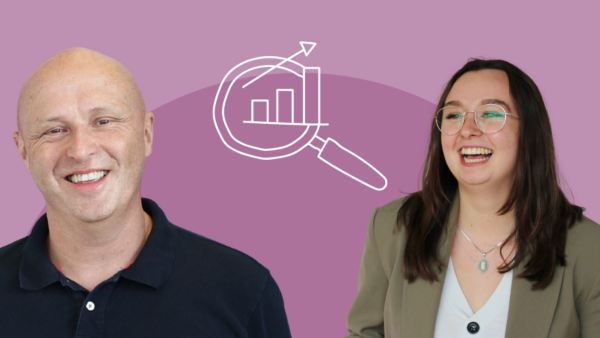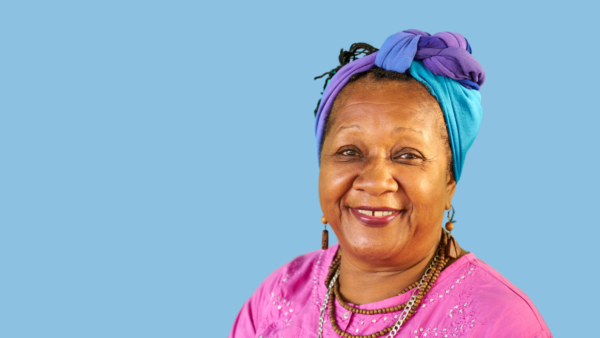Podcast transcript:
Privilege – a personal view
What is privilege, and why does it matter?
Privilege is getting quite a bit of airtime right now. So as a white, straight, cis, non-disabled, middle-class male, I’d like to spend today’s podcast introducing the idea of privilege, talking a little about the journey I’ve been on with it, and to talk about its importance and relevance to work and to life today.
I appreciate that talking about privilege at all can raise questions. Like ‘Who is this guy to be talking about privilege anyway?’, ‘Why should I listen to this? I come from an underprivileged background and I’ve worked hard to get where I am, so this doesn’t apply to me’ or even ‘I’m done with all this woke nonsense, can’t we just move on?’. I appreciate all that, so all I ask is that you spare me 10 minutes to see if you get any value in what I’m going to share.
The reason I shared all that info about me just now is to let you know my privilege, so let me start with that. Rewind about a year and at Strengthscope, the team was on a journey to understand diversity, equity and inclusion better and we had retained Alison Pacifico-France to run a programme for us. Alison has recorded a couple of very powerful and challenging conversations with me on the show on the topic of DEI so do look for those if you’re interested… they are podversation 25 – Why you need a global perspective on DEI and podversation 18, The future of DEI in organisations – courageous conversations.
So what is the privilege walk? A moment of truth
At one of our workshops, Alison asked us to participate in an activity called a ‘privilege walk’. We were doing it virtually and I imagine the activity is even more powerful when done in person, but it was still very affecting for many of us in virtual form, me included. You’re asked a series of questions and for the first set, if you answer yes to a question, you take one step forward (or give yourself a point in our virtual case). Some examples are:
- If you studied the history and culture of your ethnic ancestors at school, take one step forward.
- If you almost always feel comfortable with people knowing your sexual orientation, take one step forward.
- If you feel certain that you will not be followed, harassed, or watched under close surveillance while shopping, take one step forward.
At the end of the first question set, you then switch to a new set where if you answer yes you take one step back. Some examples here are:
- If you started school speaking a language other than English, take one step back.
- If you have ever been the only person of your race/ethnicity in a classroom or place of work, take one step back.
- If you grew up in an economically-disadvantaged or single-parent home, take one step back.
At the end of the exercise, you have a points total and you are asked to share that (virtually anyway) by placing yourself on a line from +20 to -20. In the real life version, it’d be obvious where you’ve ended up because you’ve been stepping forwards and backwards the whole time. That moment, where you see where you are relative to everyone else was, for me, emotional. I was the highest in the group, meaning I have experienced more privilege in my life than anyone else in my team. Not because of anything I’ve been in control of, but because of my life circumstances from birth. There were people ranging from -10 to +15 and while you kind of know that must be true, to see it like that and to hear the reasons why people placed how they placed really brought it home.
I’ll share with you now how I felt because I believe it’s relevant to understanding and accepting privilege. I felt guilty and ashamed that because of nothing that I’ve been in control of, but was just born with, the world for me is a relatively easy place to navigate, free from judgement or oppression, aggression or suspicion, just because of my birth circumstances.
I appreciate that guilt and shame aren’t particularly helpful emotions or states to be in but they are data, and what this data was telling me was that, as I’d always known, this level of inequity of experience in the group wasn’t right and that by being part of the various systems which maintained the status quo of inequity, I was right to feel guilty, because unless I took action, I was complicit in allowing things to continue as they had done. I would say that on my journey since then, I have had my eyes wider open than before, more accepting of my privilege and more committed to doing something with it.
Defining privilege – what is privilege and how does it create unfairness?
Let’s get into some definitions. Privilege, from a simple dictionary point of view, is described as “a special right, advantage, or immunity granted or available only to a particular person or group.”
Getting more specific, a more comprehensive definition of the idea of social privilege is that it is “special advantage or entitlement, which benefits one person, often to the detriment of others. Privileged groups can be advantaged based on education, social class, caste, age, height, weight, nationality, geographic location, disability, ethnic or racial category, gender, gender identity, neurology, sexual orientation, physical attractiveness, religion, and other differentiating factors.”
American sociologist Michael Kimmel uses the metaphor of a wind to explain the concept. He explains that when you walk into the wind you have to struggle for each step that you take. When you walk with the wind, you don’t feel the wind at all but you still move faster than you would otherwise. The wind is social privilege and if it flows with you, it simply propels you forward with little effort of your own.
Jon Amoechi on privilege – a really accessible introduction
To bring this into a real world context, I am going to read you a transcript from a truly excellent introduction to privilege by author and ex NBA basketballer John Amoechi who was responding to the rise of black lives matter following the death of George Floyd in 2020. I share this unabridged, apart from the intro para which gives the context I’ve just summarised. You can find the video online, I’m sharing it nearly in full because it just nails so much of what I want to share and it comes from someone who, unlike me, has experienced bias based, in his case, on his race:
“Privilege is a hard concept for people to understand, because normally when we talk of privilege we imagine immediate unearned riches and tangible benefits for anyone who has it. But white privilege and indeed all privilege is actually more about the absence of inconvenience, the absence of an impediment or challenge, and as such when you have it, you really don’t notice it, but when it’s absent, it affects everything you do.
There are lots of types of privilege out there, the privilege of being born into a wealthy family versus a poor family is kind of obvious, but then there’s the privilege of being able-bodied versus having or acquiring a disability that most of us take for granted. I have two very close friends who are wheelchair users and I’ll be honest, when I first met them I was completely ignorant about the everyday ways their lives are made harder through no fault of their own. Some of these ways are simply thoughtless, but some of them are just the way we live, just the way we build infrastructure, just the way everything works that just makes their life harder than mine. That’s just one of the ways that I am privileged and understanding that, embracing that, doesn’t make me a bad person, but ignoring it raises the chance that my friends will be excluded in ways that are not obvious to me and as their friend I can’t allow that.
There’s a good chance, as a white person watching this, your life is already hard. Every day you have to overcome some difficulty or challenge just to get by, but you can still have white privilege. White privilege doesn’t mean you haven’t worked hard or you don’t deserve the success you’ve had. It doesn’t mean that your life isn’t hard or that you’ve never suffered. It simply means that your skin colour has not been the cause of your hardship or suffering.
There is nothing but a benefit to understanding our own privileges, white and otherwise. It brings us closer to those who are different. It helps us be vigilant about the ways we treat others different than us. It helps us make a society that is fairer and more equal. Having white privilege doesn’t make your life easy, but understanding it can help you realise why some people’s lives are harder than they should be.”
Recognising and acknowledging your privilege
I hope I’m bringing you something new here, at least a little bit. Or if not, something that’s worth coming back to, to check in with yourself on. This is tough territory, there are no easy answers, there are no wrong or right ways to feel about this. Emotional responses to recognising our relative privilege or lack of it can be wide-ranging or transient or long-lasting. This is tough and deep territory and it brings up so much for people that it can end up being walked away from because of the fear that people have of getting it wrong – saying the wrong thing and offending someone and fearing that you’ll make things worse by talking about it.
But from my experience and from my readings, you won’t make things worse, as long as you acknowledge your privilege, and where others that you’re talking to may sit on that, and that you accept that you’re not perfect and that you’re going to get it wrong, mis-speak or not use the currently acceptable terminology to describe something in the DEI space some of the time, you’re better getting into the conversation than avoiding it.
Like I say, it isn’t easy particularly when you don’t feel the word ‘privilege’ describes your experience – it sounds like (as John Amoechi says) you’ve received some unearned riches in your life which may well not be true. When we’re talking privilege, we’re really talking here about rights. Equal rights for people of all groups irrespective of the circumstances they were born into, and most people I think would agree that that’s a reasonable aim.
There’s also the challenge that talking about privilege might lump people from particular groups into one, when actually there are big differences within those groups. I agree with that, but for me, it’s not a strong enough reason to not go there, to not get more knowledgeable about how privilege has come about, the various forms of discrimination and oppression that might have led to differences across groups and most importantly, what can be done about it.
Appreciating the power that privilege brings and moving to allyship
Once you’ve acknowledged your privilege, the next step is to get real about the power that privilege brings. Privilege means that you can do something to influence your world to change the imbalances that exist within it. On the biggest level we’re talking about social change. Realistically, most of us don’t have the power to change society as a whole. But our ‘insider’ status that comes from our privilege does bring power to make small changes in our own lives.
Now I’m not going to start getting all pious now and telling you what to do. Instead, I’m going to touch on some of the lightbulb moments I’ve had in acknowledging and leaning in to my privilege and some of the creative thinking I’ve got into to think about how I can make a difference.
By the way, we’re moving here into the territory of becoming an ally. When you’re not part of a marginalised group, what you can do is to use your privilege to support others and to make change. Strong recommend from me on this is Nova Reid’s ‘The Good Ally’. As a book, it’s a good start point and gives some practical advice on what you can do to ally well. The author does stress though that you shouldn’t just fast forward straight to the end – that you need to go through the various emotional stages that the book guides you through to give you the lasting motivation for change.
Some practical tips on allyship and being a good ally
First thing I’ve learned is to notice and act – to not be complicit, or stay silent. If you see something that looks like discrimination at work (or outside of work), be prepared to call it out (albeit with care and keeping yourself safe). That can be done subtly if someone doesn’t realise what they’ve said or done, or it may need something a little more direct in certain situations if someone is knowingly doing damage. We’re all responsible for the psychological safety of our colleagues and it’s not just about us not being prejudicial in our behaviour or words, it’s calling it out when others might be feeling unsafe.
Another part of this is to be prepared to be called out yourself and to not be defensive but accept what you’re being told as constructive and something to learn from.
My second point is to be prepared to get it wrong, lots. You need to leave your perfectionist streak at the door. If someone’s preferred pronoun is ‘they’ but you forget and use ‘she’ a couple of times, it’s not the end of the world (although don’t keep doing it). If you don’t know what the best way to describe a marginalised group is and you say ‘able-bodied’ rather than ‘non disabled’, don’t beat yourself up for all time. If you use an outdated word that isn’t ok any more and someone points it out to you, see it as learning and helpful rather than a personal attack and make the change. It’s more important to ally and get it wrong sometimes rather than to be a bystander who doesn’t act at all.
A third thing that will help with not getting it wrong so much of the time is to be prepared to ‘do the work’. And the world of DEI does tend to use this as a term quite often (‘do the work’, that is). So if you don’t know, research, read, watch, in order to be able to ally effectively. If you understand more about how the systems you’re part of came about and why they are still here, as well as being more educated on it, you can also see better how you can make a difference now.
Which brings me to my final point. Remember that you are part of a system of privilege, however hard that may be to accept. Try to lobby for change by changing that system. This is big action – writing to an MP when you come across something that seems unjust, like a lack of disabled access in your community, or something else that you feel passionate about. Choosing to spend your money with a black-owned or female-owned business to actively support more people from those groups to be successful when systems up to now have worked against them. Those kind of actions. Whatever you have in your power to do.
In conclusion – privilege brings power… it’s how you use it that counts
So that’s enough for now, I appreciate that that last part may sound a but preachy so apologies if it does. I just want to give you some tips that might be useful. And also, I’m very conscious that I’m no expert in this area. But I am trying to gain more knowledge, so I can better understand what I can do differently. There’s definitely a whole heap more that I need to do by the way, in terms of taking action and learning more. Thanks for listening, I hope you’ve found today’s podcast useful. Till next time, stay strong.













